Politics
Türkiye aims for regional solutions as it brings together Balkan countries
With the Balkan Peace Platform meeting held in Istanbul on Saturday, Türkiye strives to ensure stability in its immediate region, with which it has historical ties.
The Balkans are not only strategic for Türkiye but also a priority area intertwined with cultural and human ties, Foreign Minister Hakan Fidan said on Saturday.
“The stability of the Balkans is of great importance primarily for Europe, as well as for the peace and security of neighboring regions,” Fidan told a press conference following the meeting in Istanbul.
Fidan emphasized that the participants agreed to produce “regional solutions for regional problems” at the meeting, stating that they would address issues as they arose.
He noted ongoing discussions to raise awareness and expressed satisfaction with the shared common ground, adding that they decided to meet again every six months, with Istanbul continuing as the platform’s center for now.
The foreign minister also described the inaugural Balkan Peace Platform as an informal format and said there is a consensus to bring leaders together under this framework once progress is made.
Fidan recalled tensions between some Balkan countries but welcomed the fact that “no one wants a hot war or conflict like in the past,” emphasizing a consensus around resolving issues through diplomacy and dialogue.
He noted that while the region often focuses on problems, missing opportunities have negative economic and security consequences.
He highlighted a shared awareness and mental agreement on setting aside certain issues to pursue peaceful cooperation and enhanced connectivity in economic and other areas, calling this consensus the platform’s greatest achievement for the continuation of regional peace.
The meeting hosted the foreign ministers and top officials of Bosnia-Herzegovina, Montenegro, Kosovo, North Macedonia, Serbia and Albania. The platform aims to foster dialogue, mutual trust and cooperation among regional countries and to develop lasting solutions to regional issues.
The Balkan Peace Platform has been developed within the framework of Türkiye’s innovative diplomacy understanding and is an initiative that aims to respond to the region’s needs. Türkiye has become a remarkable actor in the Balkans as a natural result of economic growth and foreign policy versatility in the last 20 years. Ankara emphasizes peace, stability and good neighborliness in the Balkans. It offers solutions to the region’s chronic problems, as it believes that addressing expansionist nationalist tendencies and overcoming the issues created by micro-nationalism is only possible through the sovereign equality of states.
In this context, Türkiye is attentive to minorities living within the borders of the Balkan states, not to be discriminated against and to protect the identities of those peoples. Apart from its diplomatic missions, it also provides economic, technical and humanitarian aid to Balkan countries through semi-official institutions such as the Yunus Emre Institutes, the Turkish Red Crescent (Kızılay), the Turkish Cooperation and Coordination Agency (TIKA) and the Disaster and Emergency Management Authority (AFAD).
As part of Türkiye’s initiatives in the Balkans, Belgrade and Ankara initiated the trilateral consultation mechanism with Bosnia-Herzegovina and Croatia. Furthermore, Ankara regularly participates in structures such as the Southeast European Cooperation Process, the Regional Cooperation Council, and the Steering Committee of the Peace Implementation Council in Bosnia-Herzegovina. The country also contributes to regional stability through the NATO KFOR and EUFOR Althea movements.
The KFOR started its duty in Kosovo on June 12, 1999, following a U.N. Security Council decision to ensure security and stability. The mission has over 4,500 international military personnel from 27 countries, including 21 NATO members and six non-NATO partner countries. Ankara took command of NATO’s KFOR on Oct. 9, 2023, the first time it has done so. Among 27 NATO member countries and partners, Türkiye has the second-largest contingent in the KFOR, contributing at least 780 of its approximately 4,500 soldiers. Kosovo declared independence from Serbia in 2008 and was recognized by many countries, including Türkiye. However, Belgrade has never recognized Kosovo and claims it remains part of Serbia. Türkiye maintains good relations with both Kosovo and Serbia.
Noting that the initiative to convene the Balkan Peace Platform came at the directive of President Recep Tayyip Erdoğan, Fidan said regional leaders showed strong interest in the proposal.
Highlighting the Balkans as a strategic crossroads connecting Europe, the Middle East, the Mediterranean and the Black Sea, Fidan emphasized the region’s historical significance in political, economic and security matters.
He also emphasized that bilateral cooperation with regional countries is evolving on multiple levels, with high-level contacts continually expanding into new areas.
“We believe that stability in the Balkans will become permanent primarily through strengthened cooperation and dialogue among regional countries. This approach is based on the principle of regional ownership,” he said.
He stated that the Balkan Peace Platform represents a new step in regional ownership, aiming to establish a practical and effective structure that fosters honest dialogue and regular communication among all parties.
The foreign minister expressed their aim to create a foundation where the term Balkans is associated not with division and fragmentation, but with cooperation and solidarity, striving to contribute to the prosperity and peace of both the region and its neighbors.
“We aim to support existing mechanisms rather than replace any process. We offer a framework that supports the efforts of the international community, particularly the Belgrade-Pristina Dialogue process,” Fidan said, adding that participants had come together today to find solutions to Balkan issues and develop concrete projects.
“We cannot leave our future to chance or the hands of others,” Fidan said, adding that they discussed regional issues with participants, emphasizing that establishing stability and prosperity across the Balkans is a top priority.
“We exchanged views on various topics, including political developments, energy security, strengthening connectivity, regional cooperation and capacity-building opportunities. We also evaluated the future of the Balkan Peace Platform, aiming for it to serve as a complementary format to existing initiatives in the region,” he said.
The foreign minister highlighted a shared commitment to hold regular meetings and prioritize projects that will concretely advance regional cooperation.
He also stressed that in today’s global crises and rising uncertainties, joint solutions are essential, emphasizing the urgent need to strengthen regional dialogue and noting that decisions about their region must be made collectively.
Fidan expressed hope that the Balkan Peace Platform will serve this purpose, adding that the initiative was launched with a joint effort to build a Balkans that collaborates and embraces its diversity as a strength.
EU accession
On the concrete decisions made during today’s talks, Fidan recalled that six of the seven participating countries are EU membership candidates and said, “One of our common agenda items was how we can share experiences within the EU accession process,” focusing on coordinated positions and raising regional awareness in Brussels.
Fidan said the Balkan Peace Platform offers a valuable forum for discussing shared experiences on EU visa and customs union policies, regional challenges tied to EU accession, and mutual awareness of sensitivities between the EU and the Balkans.
“Historically, geographically and culturally, these countries are a continuation of one another,” Fidan said. Stressing the importance of joint action, he added that regional nations agreed to enhance cooperation in trade, economy, politics and defense based on their mutual interdependence.
He noted that the EU is developing two projects funded by special funds – the European Security Action (SAFE) and Rearm Europe (European rearmament plan) – that grant specific rights to member states and have different provisions concerning candidate countries.
He added that a joint decision was made to collaborate on issues concerning candidate countries.
Fidan emphasized the need for defense industry cooperation beyond SAFE and Rearm Europe, highlighting the different capacities among countries, noting that this topic was also on the agenda.
Interest in the Balkans
Fidan highlighted the growing interest of Turkish tourists in Balkan countries, especially among young people, emphasizing the importance of mutual understanding through education and observation.
He noted that Turkish tourists rank first in visitor numbers across six Balkan countries, with tours to cities like Belgrade, Pristina, Skopje and Tirana becoming increasingly popular.
He added that these countries welcome this trend, while Istanbul and other parts of Türkiye also remain major attractions for tourism and business, emphasizing the need to develop further and better assess these connections.
Russia-Ukraine
Fidan underlined that one key agenda of the Russia-Ukraine talks in Istanbul is bringing the leaders together.
He recalled that Russia and Ukraine expressed their willingness to meet in Istanbul under Türkiye’s hosting, but noted that ongoing negotiations continue over the timing and conditions of the meeting. “As negotiators, we are making efforts to find a middle ground between Ukraine and Russia’s differing positions.”
He pointed out increasing agreements on prisoner exchanges and humanitarian efforts, saying: “Both sides are showing goodwill and effort to implement this, which greatly pleases our president and us.”
Fidan highlighted U.S. President Donald Trump’s interest in the cease-fire between Russia and Ukraine, adding: “Our president wants to accelerate this process.
He is a firm believer in leaders’ diplomacy, believing that certain deadlocks between negotiating teams can be resolved through a leaders’ meeting. “We may take initiative to make this possible,” he added.
The foreign minister said that both the Russian and Ukrainian leaders are willing to meet, but there is a disagreement over the conditions for such a meeting.
He said the disagreement is not over whether the leaders should meet, but rather over the conditions, timing and agenda of the meeting, stressing that progress must first be made at the delegation level.
Fidan expressed hope that, once the groundwork is laid, a trilateral meeting hosted by Erdoğan in Istanbul could take place in the near future.
Politics
32 released after pleading remorse in IBB corruption case
With the latest confession in the corruption investigation against the Istanbul Metropolitan Municipality (IBB), run by the main opposition Republican People’s Party (CHP), the number of suspects released under the effective remorse law has climbed to 32.
Burak Korzay, the general manager of ISFALT, an asphalt production subsidiary of IBB, was released from prison on Monday morning after pleading “adequate remorse.”
Korzay, who was arrested on June 4, provided testimony on July 10 and July 21 that prosecutors deemed sufficient for his release. His statements reportedly helped advance the case, according to judicial sources.
According to his testimony made public, Korzay alleged a covert “system” of coercion and illicit payments at the heart of the widening corruption probe.
Korzay claimed companies were forced to make off-the-books payments to receive funds already owed to them by IBB. He directly implicated Ertan Yıldız, chair of IBB’s Subsidiaries and Affiliates Commission, stating that Yıldız demanded 30 million lira from contractor Aziz İhsan Aktaş, warning, “They won’t pay him unless you send it.”
When Korzay objected, Yıldız allegedly replied, “Is this the first time you’ve heard of the system?” and said the money was needed for the upcoming election campaign budget of CHP.
Korzay said he immediately told Aktaş to pursue legal means instead of making the payment, but Aktaş insisted on paying in order to collect his receivables quickly. The money, according to Korzay, was allegedly dropped off in a bag at a hotel in Kilyos.
He also claimed Aktaş later paid $100,000 to another suspect, Baki Aydöner, who Korzay said had influence over vehicle and waste tenders in various municipalities. Tender procedures, he alleged, were manipulated by senior IBB officials, including Deputy Secretary General Arif Gürkan Alpay and Fatih Keleş.
Korzay stated that IBB approved projects without actual financial resources, launching tenders to appear active while using them to generate unofficial revenue. Detailed knowledge of tenders was allegedly shared informally, allowing preferred companies to secure lucrative contracts. “The real profit came from İSFALT tenders,” he said.
CHP-run municipalities are accused of taking bribes and engaging in irregularities in public tenders. President Recep Tayyip Erdoğan has recently described operations and allegations as “tentacles of an octopus” that stretch across various administrative bodies overseeing municipalities.
Although CHP-run municipalities were already under investigation and several mayors were detained for corruption last year, IBB has been under the spotlight as its high-profile mayor was arrested in March on graft charges.
Investigators have launched successive operations into an alleged criminal network run by former Mayor Ekrem Imamoğlu and expanded another investigation linked to a businessman who was awarded a lucrative contract by district municipalities.
Operations are the culmination of four separate investigations and are mainly based on the confessions of Aziz Ihsan Aktaş, a businessperson identified as the head of a criminal network active in municipalities. Aktaş’s confessions revealed the scale of corruption at IBB and other CHP-run districts, including Istanbul’s Beşiktaş, as well as municipalities in other cities, such as southern Adana.
As the investigation deepens, a growing number of former suspects, including many prominent businesspeople, municipal officials and legal professionals, have opted to cooperate with prosecutors in exchange for leniency.
Businessperson Ahmet Sari and Ismail Sari, construction figure Adem Soytekin and his brother Ogün Soytekin are among those who have testified under adequate remorse provisions.
Other notable individuals who provided testimony include Nezahat Kurt, ISTAÇ Board Chair Ziya Gökmen Togay, Istanbul Metropolitan Municipality surveying engineer Yakup Öner and lawyers Orçun Muhittin Yılmaz and Bülent Yılmaz. While several of these testimonies led to releases, not all statements were deemed substantial enough to warrant a release. Togay, Öner and Yılmaz, despite their cooperation, remain in custody.
The list of released suspects features high-level officials and influential figures across various sectors. Among them are: Murat Abbas, the head of IBB Culture Inc.; Ertan Yıldız, head of the IBB Subsidiaries and Affiliates Commission; businesspeople Ali Nuhoğlu, Seyfi Beyaz, Ahmet Sari, Ismail Sari, Ahmet Çiçek, Eyüp Subaşı, Noyan Kırmızıgül, Murat Ilbak, Muhittin Palazoğlu, Kabil Taşçı, Mehmet Ilhan Gülay and Nezahat Kurt.
Other suspects include Servet Yıldırım, personal driver to the arrested suspect Hüseyin Köksal, lawyer Süleyman Atik, construction technician Altan Gözcü and accounting manager Murat Bıyık; advertiser Hüseyin Kum; owners of Yapı Merkez Construction, Mustafa Başar Arıoğlu, Erdem Arıoğlu and Özge Arıoğlu; Ogün Soytekin, brother of arrested Adem Soytekin; and Murat Erenler, his bodyguard; business people Şeyhmus Sarıboğa, Güngör Gürman, Hasan Özsoy, Taner Gümüş and Kadir Gümüş; lawyer Bülent Yılmaz; former CHP Şişli Municipal Council Member Umut Şenol; and businessman Berat Çağrı Kapki.
Politics
Parties scramble to explain terror-free Türkiye to public
The terror-free Türkiye initiative moves forward with the first instance of disarmament by the terrorist group PKK, but there is still a lot to do for its main actors. As Parliament considers forming a committee to oversee the process, parties directly and indirectly involved in the initiative hope to garner public support for the initiative.
The ruling Justice and Development Party (AK Party) and its ally, the Nationalist Movement Party (MHP), will hold public meetings throughout the rest of the summer to explain the initiative, particularly to their electorate. The MHP’s leader, Devlet Bahçeli, is the informal architect of the initiative that began with his call to the PKK’s jailed ringleader, Abdullah Öcalan, last year to urge his group to lay down arms. The Peoples’ Equality and Democracy Party (DEM Party), closely associated with the PKK, will hold similar meetings to inform the public.
The initiative surprised many at first as it was commenced by an unexpected name who is known for his staunch support for strict counterterrorism efforts to wipe out the PKK. Bahçeli has reasoned that the PKK’s dissolution is a must to reinforce unity in Türkiye at a time of Israeli expansionism that also threatens Türkiye. The PKK’s longtime goal has been carving out a so-called Kurdistan in the southeast and it exploited the Kurdish community of the country, who were deprived of some fundamental rights in the past. Bahçeli and AK Party Chair President Recep Tayyip Erdoğan repeatedly emphasized Turkish-Kurdish unity as key to the future of the country against any separatist agendas.
A recent survey conducted by polling company ASAL earlier this month shows that more than 61% support the initiative. The initiative is not without its opponents and skeptics. The main opposition Republican People’s Party (CHP) endorses the initiative but expresses reservations about its success. The far-right Good Party (IP) flatly opposed it and plans to hold nationwide “First Duty” rallies to voice its opposition. Inspired by the first sentence of a famous address to Turkish youth by the republic’s founder, Mustafa Kemal Atatürk, the rallies aim to sway public opinion against the initiative.
Legal framework
Elsewhere, Parliament is set to launch a committee to support the initiative with a legislative, legal framework later this week. The AK Party, MHP and DEM Party announced their contributions to the committee, while other parties are expected to unveil the names of lawmakers they would nominate for the committee by Thursday.
The DEM Party on Monday announced that its deputy parliamentary group chair Gülistan Kılıç Koçyiğit, lawmakers Meral Danış Beştaş, Saruhan Oluç and Cengiz Çiçek would join the committee, while the MHP said on Sunday that the party’s deputy chair Feti Yıldız and lawmakers Muhammet Levent Bülbül, Halil Öztürk and Yücel Bulut would represent the party at the committee.
Koçyiğit said at a news conference on Monday that they opposed the initiative to be called “terror-free Türkiye” and claimed that there was a “Kurdish question” in Türkiye. “If we are going to provide a democratic solution to the ‘Kurdish question,’ we should not frame this issue through security policies,” Koçyiğit said.
Politics
Senior YPG leader says terrorist group would not abandon arms
Ilham Ahmed, a senior leader of the U.S.-backed terrorist group YPG in Syria, said they would not join the PKK for disarmament and said they would continue advocating “decentralization” in the post-Assad country.
Her comments to Rudaw are likely to anger Ankara, which is worried about the security risk the YPG poses at a time of expected dissolution of its parent terrorist group PKK.
The YPG controls parts of northeastern Syria since the civil war broke out in Türkiye’s southern neighbor more than a decade ago. Türkiye launched a cross-border offensive during the civil war to limit the expansion of the YPG and succeeded in confining it to a narrower area. After the fall of the Assad regime last December, the terrorist group, which is called the Syrian Democratic Forces (SDF) by its main partner United States, managed to negotiate a deal with the new administration in Damascus. The deal, which involves integration of the YPG into the new army of the country, is not final and Ahmed insisted that it was not “a bargain.”
In an interview published on Rudaw’s website on Monday, Ahmed said Damascus sought to “take them over” and they would not “submit.” She acknowledged that they would be integrated into the Syrian army as stipulated in a March 10 deal between Syria’s interim President Ahmed al-Sharaa and YPG leader Ferhat Abdi Şahin, but insisted that it would be based on “mutual recognition.” The YPG, which enjoyed immense U.S. military support, wants to keep its so-called autonomous “canton” situated across the Turkish border. Ahmed reiterated this stance and said they were willing to leave “some services” to Damascus’ control, “such as borders and foreign policy.”
An “autonomous” region controlled by a terrorist entity is a major threat to Türkiye, which suffered cross-border rocket attacks by the YPG in the past, as well as terror attacks by YPG members who infiltrated into the country.
On a question whether the PKK’s jailed ringleader Abdullah Öcalan asked them to lay down arms as he called upon the terrorist group, Ahmed dodged the question but flatly said disarmament was “out of question” for them, claiming it would be a “suicide” for them to lay down arms at a time of “massacres” in Syria.
Politics
Gaza, wildfires, terror-free Türkiye on agenda as Cabinet convenes
President Recep Tayyip Erdoğan will chair Monday’s meeting of the Cabinet, which will discuss a range of issues affecting Türkiye and the region.
Wildfires that spread across Türkiye amid unusual temperatures will likely dominate the discussions. The terror-free Türkiye initiative will also be discussed at the meeting, according to media reports on Sunday. Additionally, the ministers are expected to discuss Israel’s “tactical pause” in Gaza, where the death toll from Israeli attacks has neared 60,000 since October 2023.
At the meeting, ministers will share details about a week of wildfires across the country that are still underway in some provinces, as well as how the government responded to them. Wildfires are at their worst in years for the country due to their sheer number, as a scorching heat wave has gripped Türkiye since mid-July. As of Sunday, firefighters and volunteers have been battling dozens of fires from west to the south, while Agriculture and Forestry Minister Ibrahim Yumaklı said on Sunday that they worked to contain 84 blazes in just one day on Saturday.
Another important topic for the Cabinet is the disarmament of the PKK terrorist group as part of the terror-free Türkiye initiative launched last year by government ally Nationalist Movement Party (MHP). This will be the first Cabinet meeting before a parliamentary committee set up to tackle the initiative will start work later this week. The Cabinet will assess the stage of the initiative in the wake of the first act of disarmament by the PKK earlier this month in northern Iraq.
The Cabinet will also discuss the latest developments in Gaza after Israel declared a “tactical pause” to its attacks on the Palestinian enclave amid international pressure and the beginning of a limited aid flow for Palestinians left starving by the Israeli aggression. Türkiye is a major critic of what it calls Israel’s genocide targeting Palestinians and has long sought to deliver aid to desperate Gazans, although Israel’s blockade has hampered the efforts.
Politics
Kurtulmuş to represent Türkiye at world parliament speakers conference
Parliament Speaker Numan Kurtulmuş is set to visit Switzerland from July 29 to 31 to attend the Sixth World Conference of Speakers of Parliament.
The high-level international event, hosted by the Inter-Parliamentary Union (IPU) at the United Nations Office in Geneva, will convene parliamentary leaders from around the world alongside representatives of the United Nations.
The conference will focus on global cooperation amid rising challenges, featuring key panels on topics such as parliamentary cooperation and multilateralism for peace, justice and prosperity for all in a turbulent world; the participation of women and youth in parliaments in times of polarization and challenges; innovation for a peaceful future; and the role of parliaments in shaping the digital future.
Kurtulmuş will address the opening session and take part in several panels.
In addition, he will hold bilateral meetings, including those with IPU President Tulia Ackson and Secretary-General Martin Chungong.
A signing ceremony is also scheduled, marking the agreement to host the 152nd IPU General Assembly in Türkiye.
As part of his visit, Kurtulmuş will meet with members of the Turkish community in Zurich.
The conference, first established in 2000 on the eve of the United Nations Millennium Summit, aims to provide a unique forum for high-level engagement and dialogue among parliamentary leaders from around the world.
Previous conferences, held every five years since then, have served as catalysts for shaping and strengthening the parliamentary dimension of global governance, thereby helping to bridge the democracy gap in international affairs.
This occasion will mark the culmination of two years of work by a preparatory committee comprising approximately 20 speakers of parliament from all regions of the world, and promises to be the largest gathering of its kind, according to the IPU.
The union said in keeping with its inclusive approach, the conference will also feature prominent leaders from other international organizations, academia and civil society organizations, as well as the media.
Politics
Erdoğan lauds France’s decision to recognize Palestine
President Recep Tayyip Erdoğan congratulated France for its decision to recognize the State of Palestine in a phone call with French leader Emmanuel Macron on Sunday.
Macron stated on Sunday that he had a phone call with Erdoğan, and in a social media post in Turkish, the French leader said they discussed the situation in Gaza and “perspective on a two-state solution conference.”
“Everything must be done for the peace and security of Israelis and Palestinians,” Macron said in his post.
The Turkish Presidency’s Directorate of Communications stated in a written announcement on its official X account that, during the call, Erdoğan emphasized the worsening humanitarian situation in Gaza. Erdoğan stressed that the international community should find an emergency solution to the matter. The president stated that a two-state solution was necessary for achieving lasting peace in the region.
Macron announced Thursday that Paris would formally recognize Palestine during the U.N. General Assembly in September.
France is set to become the first member of the G-7 – a group of the world’s largest advanced economies – to recognize a Palestinian state. To date, 147 of the 193 U.N. member states have officially recognized Palestine.
The move comes amid Israel’s continued offensive on the Gaza Strip since Oct. 7, 2023, which has killed nearly 60,000 Palestinians – most of them women and children – and caused the collapse of Gaza’s health system and severe food shortages.
France on Saturday said that recognizing a State of Palestine is an “essential step” on the path to peace and regional stability, reaffirming its commitment to a two-state solution based on international law.
“As France prepares to recognize the State of Palestine, let us recall the recognition of the State of Israel by France on Jan. 24, 1949,” the French Foreign Ministry said in a post on X.
Citing a historic letter from former Foreign Minister Robert Schuman, the ministry emphasized that France’s 1949 recognition of Israel did not prejudge final borders – a principle it now echoes in its approach to recognizing Palestine.
“Three-quarters of a century later, recognizing a State of Palestine is an essential step on the path to peace and regional stability,” it added.
The ministry said that official recognition would help facilitate “indispensable negotiations” between Israelis and Palestinians on final status issues, including borders.
Palestinians seek an independent state in the occupied West Bank, occupied East Jerusalem and Gaza, all territories Israel occupied in the 1967 Middle East war. Israel’s government and most of its political class have long been opposed to Palestinian statehood.
France’s decision marks an “important contribution” toward “implementing the two-state solution, which offers the only lasting basis for peace and security for Israelis and Palestinians alike,” Irish Prime Minister Simon Harris said on X.
Spanish Prime Minister Pedro Sanchez also voiced support for the French decision, stressing the urgency of preserving the path to a negotiated settlement.
“I welcome that France joins Spain and other European countries in recognizing the State of Palestine,” he said on X.
“Together, we must protect what (Prime Minister Benjamin) Netanyahu is trying to destroy. The two-state solution is the only solution,” he added.
Scottish First Minister John Swinney also weighed in, calling on the U.K. government to take similar action. “The U.K. should follow the example of France tonight and recognize the State of Palestine. This is essential for peace,” he said on X.
“The cease-fire and humanitarian aid must start now,” he added.
The Palestinian Authority welcomed the announcement. A letter announcing the move was presented to Palestinian President Mahmoud Abbas in Jerusalem on Thursday.
”We express our thanks and appreciation” to Macron, Hussein al-Sheikh, the Palestine Liberation Organization’s (PLO) vice president under Abbas, posted. ”This position reflects France’s commitment to international law and its support for the Palestinian people’s rights to self-determination.”
Israel, meanwhile, denounced the decision.
”We strongly condemn President Macron’s decision,” Netanyahu said in a statement. He claimed such a move “rewards terror and risks creating another Iranian proxy.”
Türkiye is a staunch supporter of the Palestinian cause in the face of atrocities by Israel and has launched a diplomatic blitz for an end to the conflict. On every diplomatic platform, Turkish officials advocate for a two-state solution that would resolve the tensions.
France and Saudi Arabia will chair a ministerial event between July 28 and July 30 in New York for a peaceful solution to the Palestine-Israel conflict and the accomplishment of the two-state solution to the longstanding issue. Deputy Foreign Minister Nuh Yılmaz will represent Türkiye at the event.
The event will have eight working groups on different topics and Türkiye, along with Ireland, will co-chair a working group on safeguarding the two-state solution. It will focus on concrete steps to realize the two-state solution.
In an interview with French weekly Le Journal du Dimanche on Saturday, French Foreign and European Affairs Minister Jean-Noel Barrot said France and Saudi Arabia plan to lay out a proposed postwar roadmap leading to a two-state solution covering security, reconstruction and governance, which will be compatible with the Abraham Accords negotiated by U.S. President Trump.
The French minister added that in the coming weeks, the European Commission would take a tougher stance on Israel and demand a stop to building any new settlement projects in the West Bank, and also an end to militarized policing of humanitarian aid distribution.
Barrot also called on fellow European countries to demand the removal of the financial blockade on the Palestinian Authority, so it can receive the 2 billion euros ($2.35 billion) it is owed.
-

 Lifestyle22 hours ago
Lifestyle22 hours agoNational Geographic highlights magic of Cappadocia
-
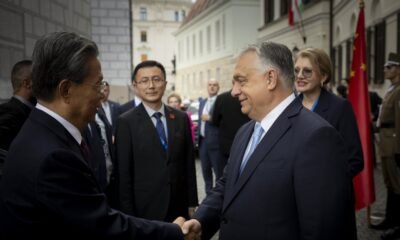
 Economy19 hours ago
Economy19 hours agoOrban slams US deal, says Trump ‘ate’ EU chief ‘for breakfast’
-
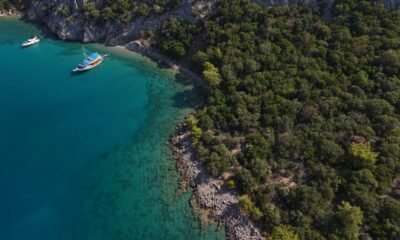
 Lifestyle19 hours ago
Lifestyle19 hours agoTürkiye’s Mediterranean paradise: Tourism spot for nature lovers
-

 Daily Agenda3 days ago
Daily Agenda3 days agoTurkish Defense Industry changed the course of the war
-
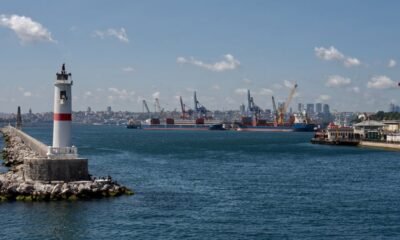
 Economy3 days ago
Economy3 days agoTürkiye sees exports to Africa near $10B in 1st half of 2025
-
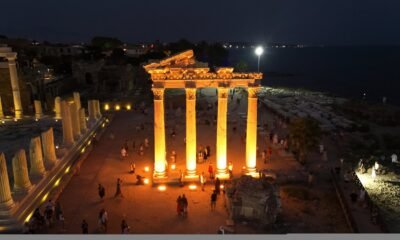
 Lifestyle20 hours ago
Lifestyle20 hours agoSide Ancient City’s nighttime glow captivates visitors in Türkiye
-
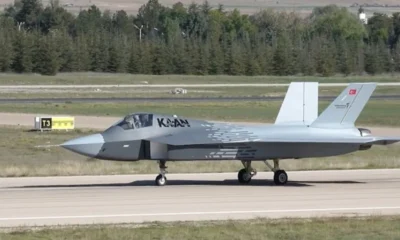
 Daily Agenda3 days ago
Daily Agenda3 days agoLast minute | Historical moments in the defense industry: 48 signatures were signed for the sale of Kaan
-
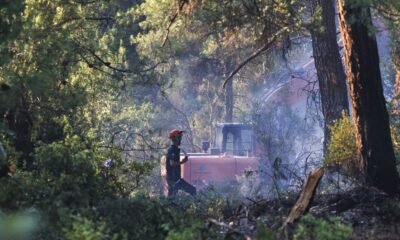
 Refugees1 day ago
Refugees1 day ago2 volunteers die fighting Turkey wildfires, raising deaths to 17 since late June




